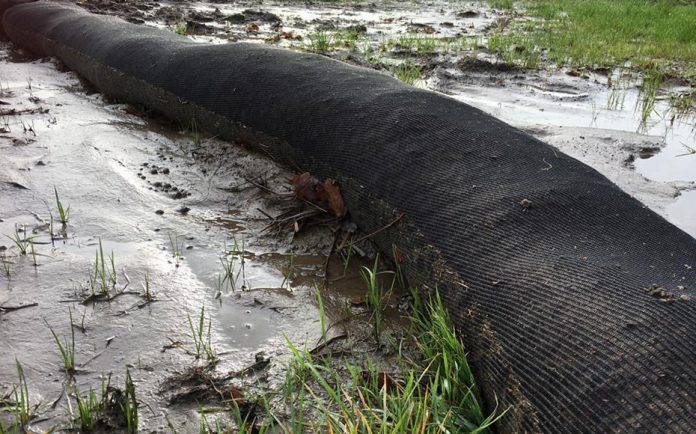Severn Trent is using ‘giant socks’ to collect essential minerals used on farmers’ fields before they get washed away, as part of a new ground-breaking phosphate trial.
The Catchment Management and Biodiversity team at Severn Trent have pioneered new technology that will allow them to capture phosphate – an essential mineral for growing crops, by using large tubular mesh structures known as filter socks.
These giant socks are filled with material that absorb phosphate and trap sediments before they run off into river catchments, where supply is under increasing threat because of a greater demand for food, fuelled by population growth.
Responding to this global issue, catchment management specialists at Severn Trent are working closely with farmers across the region, installing them at sites in Cropston, Leicestershire; Aqualate Mere, Shropshire; and within the river Bourne catchment in Warwickshire.
The technology has been adapted from filter socks developed in the US, where they are commonly used as a way to control sediment run-off from construction sites.
Alex Cooke, Principal Catchment Scientist at Severn Trent is leading the trial. She said: “This exciting trial is all about protecting and collecting phosphate – a mineral that is absolutely essential for growing crops. Unfortunately, because of the growing demand for food around the world, caused largely by population growth, supplies of this key fertiliser are coming under increasing threat.
“When phosphates are used on agricultural land they can wash away into local watercourses, which means this precious resource is lost, and causes algal blooms upon entering our reservoirs. That’s why Severn Trent is taking action now, by essentially putting giant socks in farmers’ fields, that’ll absorb these essential minerals so they can be used again and protect our water supplies for our customers.”
Alex added: “Our ultimate aim is to be able to offer them to farmers across our region through our Severn Trent Environmental Protection Scheme (STEPS). In these trials, we are not only interested in the performance of the socks, but we’re also interested in understanding how they perform under different environmental conditions and locations.”
The trial, which will run until 2021, began in Autumn 2019 and will also look at whether phosphate socks offer any other environmental benefits too.



